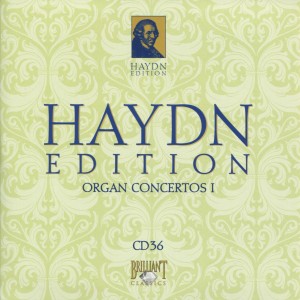 Today’s music is Organ Concertos.
Today’s music is Organ Concertos.
That means I’ll probably hear an organ that’ll remind me of the score of a silent film, something akin to Phantom of the Opera or some other scary movie.
It’s inevitable, really.
Any time I hear and old-timey organ in Classical music, I think of the opening flourish of Bach’s Toccata and Fugue in D Minor (BMV 565), which is one of the most distinctive – and famous – passages of music ever written:
See what I mean? You know that sound even if you don’t know it’s name. (Now you do. Write it down in case you ever find yourself on Jeopardy!)
But that’s not the music I’ll hear today. For one thing, it’s not Bach on tap; it’s Haydn.
For another, according to the list of Haydn’s concertos published on Wikipedia, today’s musical selection selection was published in 1756. (Haydn was 24.) Bach lived from 1685 – 1750. So, although, Haydn could have been influenced by Bach (and, most likely, was), I think he was too busy blazing his own trail to copy the works of Johann Sebastian note for note.
Meaning? Meaning the style of music had changed from the early days of Bach to the heyday of Haydn. Therefore, the organ solos in Haydn’s works won’t sound the same as the ones in Bach’s.
Here’s Haydn’s Organ Concerto in C No. 1 (NOTE: This is not the version to which I am listening today):
This is interesting music. Not the kind of stuff I’d put on as background for writing, unless I was writing a screenplay or book about the circus (the organ has a circus-like feel to it). It’s a little too distracting for background music, although I do not mean it is unpleasant. It’s kind of fun, really. Especially Movement I (“Moderato”). Very sprightly. Kind of Baroque-like.
The next concerto on today’s CD is Organ Concerto in D No. 2, which was composed in 1767 (Haydn was 35).
I liked the feel of Organ Concerto in D No. 2 from the start. Movement I (“Allegro moderato”) has an even livelier spring to its step. And a more full sound before the organ begins to play around the 1:20 mark. Then it pretty much sounds like Organ Concerto No. 1.
Here’s Haydn’s Organ Concerto in D No. 2 (NOTE: This is exactly the version to which I am listening today):
In the words of Monty Python, and now for something completely different…
The third composition on today’s CD is Flotenuhr 1789.
Oh-oh. Research time. What does the word Flotenuhr mean?
Google to the rescue.
I eventually discovered the word means “mechanical clocks.” But that opened up a new set of questions, namely “the hell is a mechanical clock? and what does it have to do with music?”
After a bit more Googling, I found a book called Did You Know? A Music Lover’s Guide to Nicknames, Titles, and Whimsey by Seymour L. Benstock:
MECHANICAL CLOCK MUSIC \ A sixteenth-century definition called this “an instrument which goeth by itself” and describes a class of mechanical clocks (known in German as flotenuhr) as well as other instruments in which sound is produced mechanically. There are thirty-two works by Haydn, six by Beethoven, and twenty by Handel for these clocks, which contains tiny barrel organs and played on the hour, half hour, or every fifteen minutes (from page 125).
What does such music sound like? Surprisingly, not how I thought it would. Here I am thinking it would be something very mechanical, sort of like gears and springs. But it’s more like something from a circus. Or a child’s wind-up toy.
Listen for yourself. Here’s Haydn’s Flotenuhr 1789 (NOTE: This is exactly the version to which I am listening today):
I assume it’s titled Flotenuhr 1789 because it was written in 1789. If so, that would mean Haydn was 57. A little old to be playing with mechanical clocks, I should think. But, hey, who am I to argue with Franz?
NOTE: The Flotenuhr compositions are very short, mere snippets, really. Movement I (“Andante”) is only 1:29 in length. Movement II ( “Fuga: Allegro assai”) is only 1:33 in length. The short duration, combined with the quirky sound, make these compositions more novelty than something I’d take seriously.
The last music on today’s CD is Organ Concerto in C No. 5, composed in 1763 (Haydn was 31 years old).
It sounds a lot like the first two Organ Concertos. It’s interesting, especially Movement III (“Allegro”), which has a formal dance feel to it.
Here’s Haydn’s Organ Concerto in C No. 5 (NOTE: This is exactly the version to which I am listening today):
My favorite compositions on today’s CD are the two movements of Flotenuhr 1789. Not because they’re the shortest; rather, because they’re the quirkiest…and the ones that gave me something cool to discover: “mechanical clocks.”

I have never heard of Flotenuhr before. Very interesting! I love learning all these new terms you’re discovering.